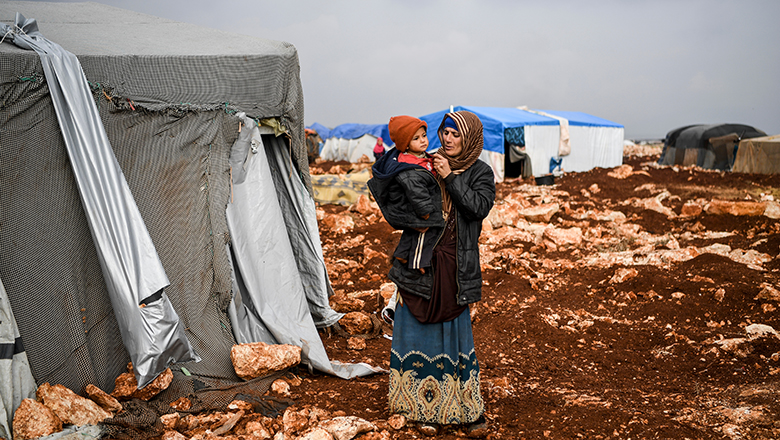15 June 2020
How north-west Syria is preventing the spread of coronavirus against the odds
Despite suffering nine years of conflict, the health system in north-west Syria is using innovative approaches to contain Covid-19.

- North-west Syria has only 1.4 medical doctors per 10,000 people, 0.625 hospital beds per 1000 people, and only 47 adult ventilators for the whole region.
- Despite this, the health system in north-west Syria is using innovative approaches to contain Covid-19.
- Social media tools such as WhatsApp are being used to collect and communicate health information and encourage thousands of volunteers to join the ‘Volunteers against Corona’ campaign.
Despite the ongoing conflict and severe lack of medical resources, the health system in northwest Syria is using innovative approaches to contain the spread of Covid-19, according to a new report. Local organisations have been working with researchers from King’s College London to implement virus warning and surveillance systems and communicate key health information with displaced populations via WhatsApp and social media.
The study hopes that these on-the-ground efforts led by community organisations such as the White Helmets can be quickly scaled up to bolster the capacity of the health system, before the virus begins to spread more rapidly.
The health system in northwest Syria has faced enormous challenges over nine years of conflict. Daily attacks on health workers and facilities, the collapse of central governance, a lack of resources and supplies, and a rapidly changing humanitarian, political and military environment have all contributed to severely weakened healthcare system. Having survived nearly a decade of civil war, the region now faces a new kind of enemy.
Back in March the World Health Organisation (WHO) warned of the potential for the virus to spread catastrophically in the war-torn region, which is home to around 35 million people living in precarious and vulnerable living conditions. The fragile health system would be rapidly overcome given the severe lack of medical personnel and equipment – there are only four doctors per 10,000 people, less than one hospital bed for every 1000 people and only 47 functioning adult ventilators in the whole region.
Dr Abdulkarim Ekzayez, Research Associate in the Department of War Studies at King’s College London, said:
“Legitimacy and trust are important factors in getting the population to follow proposed guidelines in relation to Covid-19 response. Important lessons from the previous polio outbreak in Syria and from the Ebola outbreak in West Africa showed this to be the case.
“So far against all the odds the local population have been working together to put in place measures to prevent the spread of the virus. These efforts need to be scaled up to prevent the transmission of Covid-19 in a region chronically affected by a complex armed conflict.”
Whilst government-controlled Syria has reported 146 cases and six deaths from coronavirus, the north-west region has not yet been hit by the disease, although health authorities say they cannot confirm the region is free of cases given the limited testing capacity.
The region has been somewhat protected from the virus so far, given its isolation from the rest of the country and limited population movement due to the geopolitical situation.
But researchers also argue that the rapid response from communities on the ground is helping to control the spread of the virus into the region. These efforts have been supported by a group of King’s College London researchers providing technical guidance, remote training and ongoing recommendations to key grassroots organisations setting up virus response systems, including the Early Warning and Response Network (EWARN); the Idlib Health Directorate; and the Syria Civil Defence (the White Helmets).
In settings where several local groups and de facto authorities dispute power and control, these local groups, who are trusted by local people, have played key leadership roles in establishing crucial preventative measures, such as closing off all borders, encouraging social distancing, disinfection campaigns and raising public awareness.
Lessons have been drawn from previous outbreaks in the region, such as the polio outbreak in 2013 and annual seasonal influenza, and led to the Early Warning and Response Network being swiftly set up. This surveillance system is being used to monitor suspected cases and predict where the risk areas are, so that responses can be targeted to specific regions under threat. King’s researchers also helped develop a website for individuals to self-assess their symptoms so that suspected cases can be quickly identified and reduce pressure on the already over-stretched health system in the region.
Social media tools such as WhatsApp are collecting health information and sharing key information about Covid-19 amongst communities and between medical professionals. Community engagement has also been scaled up, mobilising local resources and encouraging thousands of volunteers to join the ‘Volunteers against Corona’ campaign.
However, without more resource and support from the international community to help scale up the preparedness and emergency planning efforts, it may be only a matter of time before the virus wreaks untold damage on the vulnerable and war-ravaged communities of north-west Syria.
